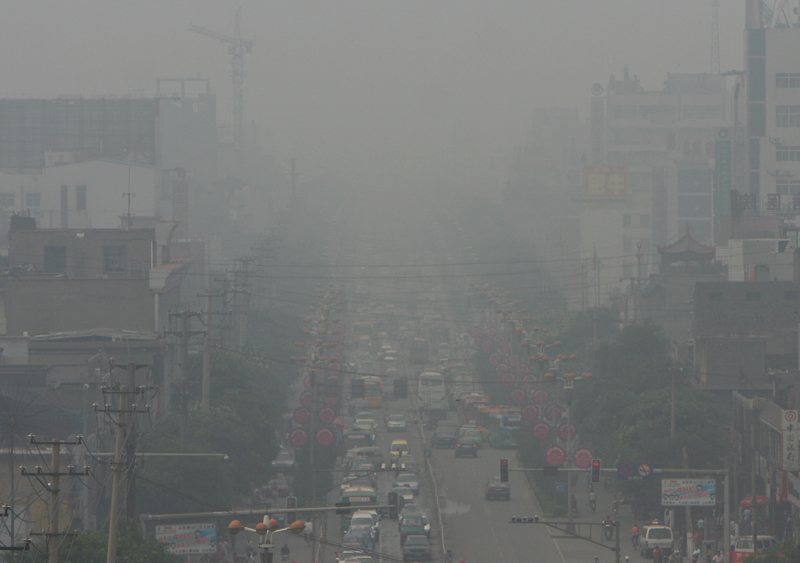 [1]
[1]Smog in Linfen, China. The city has been named one of the world's most polluted by various organizations. Photo by Flickr user sheilaz413. CC BY-NC-ND 2.0
China will no longer cap [2]pollution fines for companies in a renewed attempt to address its loose environmental regulations amid mounting public anger over runaway pollution.
The latest move is enshrined in amendments [3]to the national environmental law, which was passed by the country's legislative body last week after a two-year discussion among scholars and officials. The revised environmental law will come into effect on January 1, 2015. The old law was adopted in 1989.
Chinese media have claimed [4] the amendments make the new environmental law the strictest one in 25 years. The new law lends more power to environmental agencies to use punitive powers to rein in powerful polluters. It also vows to protect “red lines”, in reference to vulnerable ecology and water sources.
Authorities also hint through the amendment that they would allow more leeway for individuals to take legal action against environmental damages, which still remains a sensitive area of litigation in China.
China's unbridled economic development has been accompanied by severe environmental pollution, with companies often reluctant to enforce environmental laws. Its annual double-digit growth rate over the past three decades has turned the country into the second largest economy after the US, but the expansion-at-any-cost model has taken a heavy toll on the country's air, water and soil, great concerns for a public empowered by social media through which they air their grievances.
The alteration of China's environmental law underscores an urgency to tackle pollution head-on as the country reels from the widespread pollution. It came shortly after China released [5] a sobering report admitting that nearly one-fifth of the country's farmland is polluted.
Liu Meng, a UN worker with a focus on China, explained [6] what the law means for NGOs on microblogging service Sina Weibo:
过去由于一些高污染行业的“GDP效应“导致了地方政府的保护,NGO组织和环保律师在起诉污染行业方面存在阻力。新的修订案赋予一些社会组织向”污染大户“提起公益诉讼的权利,中国的非政府组织会在环保监督和推动方面将发挥更大的作用。近日河北正式启动公众参与环境保护立法,走在了前列!
Due to the “GDP effect”, many high-polluting industries gained local government's protection in the past, NGOs and environmental lawyers have a lot of difficulties in suing polluting enterprises. The new amendments have given a certain degree of rights to social organisations to sue “major polluting enterprises”, so China's NGOs will play a bigger role in environmental supervision. In recent weeks, Hebei province has announced it will initiate programs to allow the public to participate in the legislation of environmental laws, it has taken a lead role!
Zhu Haijiu, a professor of economics based in Zhejiang, wrote [7] on Weibo:
环境的悲剧,本质上是法治的悲剧,是法治沦陷的体现。
The fundamental reason for tragedies in the environment is the tragedies in the rule of law, it shows the degeneration of laws.
Earlier, Zhu told [8]Ifeng.com that it's still premature to consider the amendments’ progress:
新修订的环保法赋予环保部门更大的执法权来惩治污染企业,这算不算一个进步?笔者不这么认为,我们不能在“环保部门权力扩大”和“环境治理变好”之间划上等号。问题不在于环保部门执法力度够不够大,而在于执法能不能得到有效的监督,公众有没有途径对不作为的环保部门问责。因此,对不得力的环保执法部门的惩罚力度加大,而不是对污染企业的惩罚力度加大才算真正的进步。
The amendments will give environmental authorities greater power to punish polluting enterprises, but does this represent progress? I don't think so. We can't equate “a more powerful environmental agency” to “better environmental governance”. The problem is that law's implementation has been weak and it's not supervised effectively, plus the public has no channel through which they can hold environmental authorities accountable. Therefore, until we strengthen punitive measures against environmental authorities rather than polluting enterprises, we can't call it real progress.
Singling out a polluting factory in Foshan in Guangdong province, Weibo user “holdon2014″ offered [9] a bit of tongue-in-check commentary:
你们创收的机会来了,处罚道明化工一厂保证你们罚到手软,年终奖领不完。
Your opportunity to make money has come! You will be spending endless time to issue fines to Daoming chemical factory number 1 and your year-old bonus will be handsome.